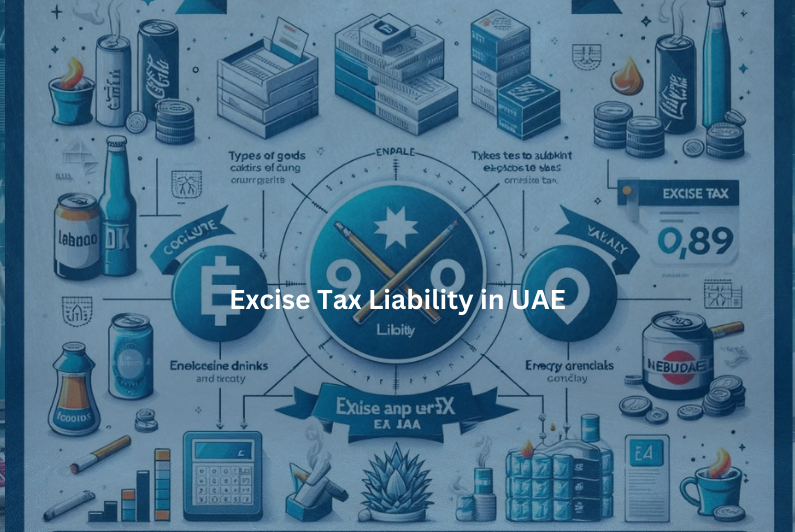Cabinet Decision No. 108/2023 on November 6, 2023, has amended, the provisions outlined in Article 2 of the Implementing Regulation of Federal Decree-Law No. 37/2017 & 7/2017 on Excise Tax in which UAE witnessed significant changes in its tax landscape, particularly concerning excise tax. The liability of individuals involved in various stages of the supply chain in the context of excise tax is a crucial aspect of tax regulation. This includes those who participate in activities where the due tax has not been fulfilled. Additionally, warehouse keepers and stockpilers have specific responsibilities outlined by the Decree-Law, ensuring the proper payment of taxes. In this discussion, we will delve into the distinct liabilities of persons within the supply chain, warehouse keepers, and stockpilers, shedding light on their obligations in ensuring tax compliance.
Excise Tax Payment Liabilities
The amended Article 2 serves as a rule in determining who bears the responsibility of paying excise tax. This revision signifies a paradigm shift, extending the scope of accountability beyond conventional roles and embracing a more inclusive approach.
Expanding The Tax Liability
The first clause of the amended Article 2 broadens the spectrum of tax liability, ushering in a new era of accountability. Taxable Entities with specified activities as per Article 2(2) of the Law-Decree find themselves in the ambit of tax liability. This includes:
- Persons Within The Supply Chain: Individuals actively participating in a supply chain where due tax has been neglected.
- Investors Or Financial Stakeholders: Those with a financial interest in a supply chain where tax payments were evaded.
- Owners Of Excise Goods: This extends to owners of excise goods, even if they don't hold traditional roles like producers, importers, warehouse keepers, or stockpilers.
Warehouse Keepers:
The second clause introduces a layer of accountability by assigning responsibility to warehouse keepers in specific instances. This departure from conventional understanding makes the warehouse keeper liable under the following circumstances:
- Non-Compliance with Record-Keeping: Warehouse keepers must maintain specified records, and failure to do so leads to direct tax liability.
- Failure to Meet Authority's Conditions: Non-compliance with conditions outlined by the Authority becomes a trigger for tax liability.
- Benefiting from Tax Evasion: Warehouse keepers are accountable if they derive any benefit from the failure to pay due tax by the person originally liable.
Read more about: How to Calculate the Excise Tax deduction in UAE
Stockpiling:
A Stockpiler is someone who holds extra Excise Goods within the State while conducting their business. These goods should not have been subjected to taxes, exemptions, returns, or deferrals.
Criteria for Excess Excise Goods:
Excess Excise Goods are those that go beyond the Stockpiler's average monthly stock level for a specific type of Excise Good over a 12-month period. This includes goods acquired by the Stockpiler before a specified date, to sell them during their business activities in the State.
Exception to Excess Excise Goods:
It calculates the average monthly sales of Excise Goods over 12 months before the specified date. If the Stockpiler holds Excise Goods exceeding two months of this sales average, regardless of the monthly stock average, these goods are considered excess Excise Goods and are subject to full tax.
Stockpile Ownership and Exemption Conditions:
A notable exemption offers respite for stockpilers under specific conditions:
- Ownership of Excise Goods for Business Purposes: The Stockpiler must own Excise Goods available for free trade for business purposes in the State, with no previous tax payment and no granted exemptions, refunds, or deferments.
- Conditional with mandatory Compliance: The stored Excise Goods should not qualify as surplus Excise Goods as per the provisions of Article 11 of this Decision.
Consequences and Significance Imperative Measures
The seismic shifts embedded in the amended Article 2 not only reallocate the burden of tax liability but also introduce safeguards and exemptions. This transformative approach emphasizes accountability, transparency, and a nuanced understanding of each entity's role within the broader tax landscape. As the fiscal landscape evolves, understanding these amendments becomes a strategic imperative for individuals and entities navigating the complex domain of excisable goods. The revised Article 2 mirrors a strategic move towards fostering transparency, accountability, and equitable distribution of tax responsibilities.
Skillfully Adapting to the Altered Environment
To navigate this altered terrain successfully, stakeholders must internalize the nuanced provisions outlined in the amended Article. This ensures steadfast adherence to the redefined framework of tax payment obligations.
In conclusion, the Decree-Law establishes clear guidelines regarding different entities’ liability in the excise tax context. Persons participating in the supply chain, warehouse keepers, and stockpilers each carry specific responsibilities to guarantee the payment of due taxes. As businesses navigate the intricate landscape of excise tax, awareness of these outlined responsibilities becomes paramount to avoid any potential legal repercussions and ensure a compliant and responsible approach to taxation. The amended Article 2 is a testament to the dynamic nature of tax regulations, reflecting an evolution towards a more inclusive and transparent fiscal framework. The transformative shifts embedded within this revision necessitate a recalibration of perspectives, pushing stakeholders to embrace a holistic understanding of their roles and responsibilities.
